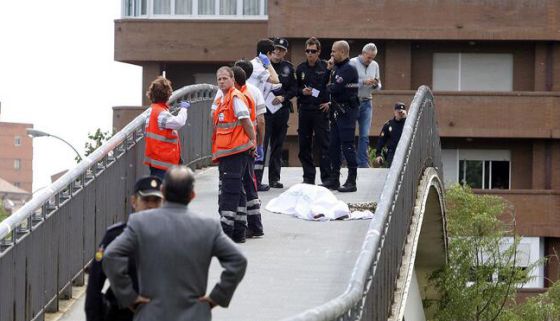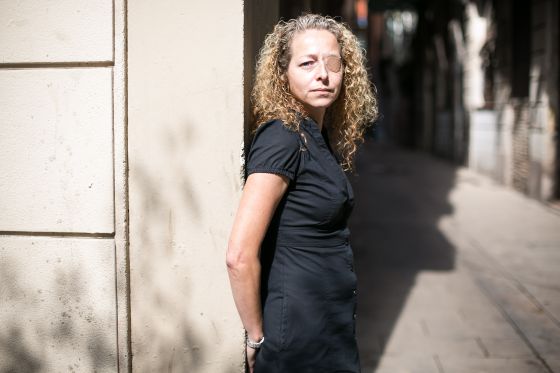El Pais....

FATAL SHOOTING
Popular Party politician shot dead in broad daylight in León
Head of Provincial Council, Isabel Carrasco, was gunned down on the street on Monday afternoon
A female suspect has been detained by police, along with her daughter
FRANCESCO MANETTO Valladolid 12 MAY 2014 - 20:39 CET1

Police and paramedics next to Carrasco’s body in León. / ICAL
Isabel Carrasco, a Popular Party politician who headed up the Provincial Council in León, was shot dead in the street on Monday afternoon, according to party sources. The incident took place in the middle of the northern city of León, close to Carrasco’s home.
A woman has been arrested over the shooting, according to police sources, who also confirmed the arrest of the alleged perpetrator’s daughter. The Interior Ministry has pointed to a possible “personal revenge” motive relating to the death. Police confirmed that the daughter had been dismissed from the Provincial Council the day before.
According to the investigation, five shots were fired, four of which hit Carrasco.
Witnesses at the scene told Spanish news agency EFE that at around 5pm a woman shot three times at Carrasco, 59, as she was walking over a footbridge across the River Bernesga. A woman and a man who were in the area at the time said they heard five shots. “We thought they were firecrackers,” the man told EL PAÍS.
The Popular Party and the opposition Socialist Party (PSOE) have announced that they will be suspending all campaigning today for the upcoming European elections.
Zero Hedge.....
Spanish Ruling Party Politician Assassinated In Broad Daylight
Submitted by Tyler Durden on 05/12/2014 13:09 -0400

Until recently, it was mostly bankers that were the victims of a perplexing epidemic of untimely deaths, either at their own hand or the result of someone else's rage. Today that changed in Spain when hours ago a member of the ruling Partido Popular, and president of the council of Leon, Isabel Carraso, 59, was assassinated in broad daylight on a street in the center of the city of Leon. Her death was certified at 5:20 pm local time.

According to El Pais, eyewitnesses report that at about five in the afternoon, a woman shot Carrasco three times, on the Bernesga footbridge over the river at the health center of La Condesa. A man and a woman who were at that time walking along the river, heard five shots passed under the gateway. "We thought it was firecrackers," said the man to El Pais. The couple turned to the area of La Condesa nearest river and heard the sound of several ambulances and police cars. "We saw the body of a person lying face down with a woman standing next to her said."
El Pais adds that Police sources have indicated that they have arrested a woman for her alleged involvement in the murder of Isabel Carrasco. The Home Office points to the "personal vendetta" as the motive for the murder. As a result the PP party has suspended all campaign activities.
El Pais adds that Police sources have indicated that they have arrested a woman for her alleged involvement in the murder of Isabel Carrasco. The Home Office points to the "personal vendetta" as the motive for the murder. As a result the PP party has suspended all campaign activities.
Judging by the market which is set to close at new all time highs, this latest assassination, be it for "vendetta" reasons or otherwise, is almost as bullish as the escalation of the second cold war over in Ukraine.
And did you hear about this little spanish news nugget ?
http://elpais.com/elpais/2014/05/12/inenglish/1399887062_952499.html
Government to create database for monitoring all Spanish bank accounts
Measure aimed at combating money laundering and terrorism funding
But experts fear new system could be used as a political weapon
The government is creating a massive database to monitor the banking activities of everyone living in Spain, with the goal of fighting money laundering and funding for terrorist activities.
Judges, prosecutors, police officers, intelligence agents and the Tax Agency will have access to the 34 million bank accounts, assets and deposit accounts included in this database.
This is the first time that the financial activities of all Spaniards and residents have become the targets of such a program. France and Germany are the only other European countries to have adopted the system.
The new rules come on the back of recommendations from the Financial Action Task Force, an international association to which Spain belongs, along with 35 other countries.
Under the new rules, banks will have the legal obligation to provide information about all their checking and savings accounts, financial assets and deposits, including the names of the account holders.
But Spanish lenders’ branches in other countries will not be subject to this accumulation of data, which will be managed by the State Secretary’s Office for the Economy and Support for Business.
Neither the State Council nor the Spanish Data Protection Agency (AEPD) have raised any objections to the creation, storage and access to the private accounts of all Spanish residents, according to an official source in the Economy Ministry.
“The amount of money in the accounts will not show up, but the identity of the account owners and other authorized users will,” said ministry technicians.
But legal sources consulted by this newspaper stressed that this type of information request is only feasible with a prior court order.
“It would be a scandal for, say, the CNI, which answers to the government, to freely access those files: it could be used politically as a weapon against their political adversaries, besides violating the basic rights of citizens by bypassing the court authorization,” said one source.
The Union of Progressive Attorneys (UPF) said that for the police to have access to this information, there must be a criminal investigation underway to justify it.
Rubén Sánchez, spokesman for the consumer association FACUA-Consumidores en Acción, noted that the project has a loophole: “The big tax evaders, the ones the government should go after, will have an easy time avoiding government control by using non-Spanish banks that do business in tax havens.”
Who eventually gets access to this sensitive information will be determined by Spain’s legal watchdog, the General Council of the Judiciary, as well as the Attorney General’s Office.
Records will be kept with the name of the agency that filed the information request and the reasons for doing so. “Open-ended, generic or approximate searches will not be allowed,” reads one of the rules of this new project, which the government passed via a royal decree.
The state secretary for the economy will now determine the minimum requirements for approving information requests. Eduardo Torres Dulce, the Attorney General, will designate an attorney to ensure the database is “used properly.” His office had repeatedly requested the creation of such records.
Besides the lenders, notaries, registrars, lawyers and insurers will also be obligated to check the identity of all individuals who make transactions of €1,000 and above when doubts exist regarding this identity.
In the case of account owners who are companies, foundations and other legal entities, the name of the person who acts in their name will have to be provided.
The rules establish reinforced measures of due diligence for transactions considered more likely to be used for money laundering, such as money transfers of more than €6,000 a month, or transfers to and from tax havens. Clients who are not residents in Spain, companies with very complex structures and holding companies are considered high-risk in this sense.
An account into which a significant number of people make deposits is also defined as “suspicious.” All transactions in a foreign currency worth €30,000 must be notified by the bank to the authorities on a monthly basis.
All information about a particular account will be deleted 10 years after it is closed.
The Spanish Banking Association estimates there were some 33.6 million checking, savings and deposit accounts in 2012.
The Economy Ministry has two years to implement the project.
Politicians and their families under scrutiny
J.M.I.
Politicians and high-ranking public officials —including judges, prosecutors and members of the Audit Court and the Bank of Spain — will be subjected to greater scrutiny of their financial activities, according to the Transparency, Access to Public Information and Good Governance Law of 2013. Also included in this list are ambassadors, business attachés and high-ranking members of the military.
At the regional and local level, councilors, deputies, mayors and government officials in general are also targeted by the law, as are the leaders of unions, business associations and political parties. This additional surveillance extends to their spouses or partners, their children and their children’s own partners.
http://elpais.com/elpais/2014/05/09/inenglish/1399653275_244898.html
Protestor lost eye as result of police rubber bullet, Barcelona court rules
Catalan government had blamed violent rioters for incident during 2012 general strike
Victim Ester Quintana wants to see officials step down over her case
REBECA CARRANCO Barcelona 9 MAY 2014 - 18:34 CET
Ester Quintana, the woman who lost on eye while protesting during the general strike of November 14, 2012 in Barcelona, was not hurt by hooligans but by a rubber bullet fired by the regional police.
A Barcelona court handed down the ruling after dismissing suggestions by the Catalan commissioner for internal affairs at the time, Felip Puig, that violent rioters were to blame for the incident.
Judge Francisco González Maíllo based his pre-trial findings on forensic reports, video footage and witness testimony.
But the plaintiff’s request that the police officer and his superior be tried for causing intentional injury has been dismissed. The judge found that the law enforcement officers’ actions were “imprudent and out of proportion,” but that there was no wilful desire to harm Quintana, 42.
“The Mossos d’Esquadra [the Catalan police] always denied having fired rubber bullets that day. This thesis has been maintained from day one by the interior department and by Mossos d’Esquadra leaders,” notes the judge.
The case triggered a government ban on the use of rubber bullets. Instead, riot police now use rifles that fire viscoelastic foam pellets.
Police director Manel Prat said at the time that he would step down if it were proven that a rubber bullet had caused Quintana’s injury. On Wednesday, several political parties asked him to honor his pledge.
“The role of Manel Prat in this crisis and his management as a whole is really hurting the credibility of the Mossos d’Esquadra and eroding citizen trust,” said the Socialist Party’s Ferran Pedret.
In recent months, the Mossos have been involved in several cases of alleged police brutality. In April two men died within 24 hours after being arrested by Mossos, although no evidence of ill-treatment has so far been found.
Quintana wants to see officials resign over her case, she told Catalan radio stations following the court’s resolution.
“There are people in the interior department and in the Mossos who denied in every possible way that rubber bullets were used,” said Quintana, in a clear reference to Prat. “Nobody has called me to apologize.”
But the Catalan interior department issued a statement noting that the judge’s findings were based on circumstantial evidence and celebrating his decision not to try the police officers for causing intentional injury. No resignations are expected.



No comments:
Post a Comment